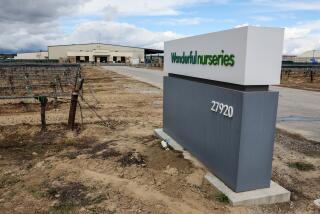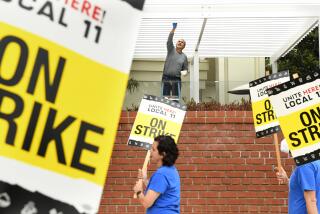Carwash workers celebrate union contract
For years, workers at the Bonus Car Wash in Santa Monica, like those in many of the carwashes that Southern Californians frequent, had a familiar routine. They showed up when the boss told them to — but couldn’t clock in until customers arrived.
Then, the California attorney general filed a suit last year against the business, demanding $6 million in back wages for workers, as well as fines and penalties. Such exploitative practices, the authorities said, were common in an industry that often pays less than minimum wage and, in some cases, forces workers to live on tips.
And on Tuesday, the Bonus Car Wash workers celebrated a victory.
Labor leaders announced that workers at the Lincoln Boulevard carwash have become the first in Southern California to unionize.
“It was a two-year struggle,” said Eduardo Tapia, a Bonus worker for five years. Now “we have 10 more minutes of break. We have our water to drink. If they say ‘Show up at work at 10:30,’ I start work at 10:30.”
Oliverio Gomez, who has worked at the carwash for nine years, said he hopes the union is the beginning of something larger. They “didn’t treat us like people,” he said of his bosses. “What I hope is that future generations who come to work here aren’t treated as badly as we were; that they’re no longer humiliated, but respected.”
The agreement comes as labor groups and law enforcement have tried to crack down on carwashes, which authorities allege violate basic labor and immigration laws with little risk of penalty because their workforce is largely undocumented and afraid to speak out.
The labor pact with the Bonus Car Wash covers only 30 workers and calls for a modest 2% raise. But labor experts said it’s significant because it establishes a procedure for hearing workers’ grievances, creates standardized rules on wages and hours, and requires any new owners of the carwash to abide by the contract.
Some in the carwash industry question whether unions can make inroads in the competitive business in which customers are highly sensitive to price.
“Most carwashes are individually owned, so the unions would have to go to each individual property and try to convince the owner, many of which have put their life savings into a small business,” said Ross Hutchings, director of the Western Carwash Assn., the industry’s trade association in Sacramento. “I think that’s going to be very difficult.”
Still, labor organizers said they are in negotiations with three small Los Angeles carwashes for similar labor pacts.
“That’ll be the next big thing: how we help the smaller carwashes that want to do the right thing and become union employers but remain profitable in the industry,” said Victor Narro, project director of the UCLA Labor Center, who has researched the local carwash industry for more than a decade and advised Bonus workers.
Owners have argued that unionization would increase the costs customers pay to have their cars washed. But Mike Watson, regional manager for Sidker Inc., which owns Bonus Car, said prices will remain unchanged.
“The employees will be happier, which makes them do a better job,” Watson said Tuesday. “And in turn, the customers will be happy.”
The campaign to organize carwashes began in March 2008, when labor groups formed Community Labor Environmental Action Network.
The group has pushed state and local authorities to sue carwashes for nonpayment of wages.
In 2007, a judge imposed $14,708 in penalties against the owners of Wash & Go Hand Wash in Irvine for not fully paying two employees.
In a landmark 2009 case, the Los Angeles city attorney’s office sued two brothers, owners of Vermont Hand Wash in Hollywood, for nonpayment of wages. Benny and Nissan Pirian were sentenced to a year in jail in the case, and they were fined and forced to pay restitution to workers.
The campaign spent a long time establishing to carwash owners “this is what happens when you follow the low road,” said Chloe Osmer, an organizer for the labor group. “Setting that precedent was important in terms of how we got to this place.”
Meanwhile, the labor group trained workers in unionizing and leadership classes, and brought in clergy and community activists to rally support for the carwash workers, Osmer said.
In the Bonus case, clergy members wrote letters and invited workers to speak to their congregations, after which congregants signed cards urging owners to negotiate with the workers.
The contract prompted Santa Monica City Councilman Kevin McKeown on Tuesday to promise to study ways for the city to contract to wash its vehicles only at carwashes that pay fair wages. “I’m very excited the only union carwash in the whole country is in Santa Monica,” McKeown said.
Whether such a campaign can succeed outside the confines of liberal, well-off Santa Monica depends on whether communities and cities can be marshaled to support carwashes that recognize employee unions, said Rabbi Jonathan Klein, director of Clergy and Laity United for Economic Justice, which worked on the campaign to unionize the carwash.
Bonus owners “are heroes” for signing the contract, Klein said. “We’re going to do what we can to get people who care about these things to get their cars washed there.”
Los Angeles Times staff writer Ricardo Lopez contributed to this report.
More to Read
Start your day right
Sign up for Essential California for news, features and recommendations from the L.A. Times and beyond in your inbox six days a week.
You may occasionally receive promotional content from the Los Angeles Times.






